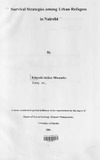| dc.description.abstract | The primary focus of this study was to investigate the survival strategies among urban
refugees in Nairobi focusing on health, shelter and food. The study employed both qualitative
and quantitative research methods. The researcher administered 124 questionnaire-interviews,
conducted key-informant interviews with UNHCR, GTZ, JRS, RCK and the Ministry of
Immigration. Review of documents was also done. Data were ana lysed through Statistical
Package for Social Sciences (SPSS). The results were presented in tables of frequency
distribution, percentages, pie-charts and graphs. The study found that there has been a
meteoric rise in the population of urban refugees since 1990.
Access and affordability of basic needs (food, health and shelter) are a survival for the fittest
issue. This comes into the front when about half of the urban refugees (47.5%) have no
income at all, yet like any other individuals they are expected to pay rent, buy food and pay
for medical expenses. By investigating the problems urban refugees face in shelter, the study found that 75.8% lives
in one-roomed houses and 33.8% share the one-roomed houses with more than three people.
Urban refugees pay much higher rent and are often required to put many months deposit
compared to local people, yet 47.5% have no monthly income at all. Their survival strategies
include begging, prostitution, dependents of transnational relatives and friends, hawking
among many others. Many of these strategies are morally not acceptable by many societies;
they are actually illegal and city authorities keep on harassing them as 34.6% reported as
having been harassed by authorities. Housing is the most challenging basic need in relation to
health and food.
An interesting observation is that majority of urban refugees (37.4% of male and 29.8% of
female) have never been to refugee camps, while government policy is clear that refugees are
only allowed out of the camps for special purposes with special permission. It means UNHCR
and the government has not been able to implement this directive. Access and affordability of
food is not a big challenge to urban refugees. This could be so because the local community
and privileged refugees could be sharing the little they have. They could also be skipping
meals, although this was not captured as a survival strategy. However most of them indicated that they depend on begging, transactional friends, casual labour among others as sources of
their income. | en |

